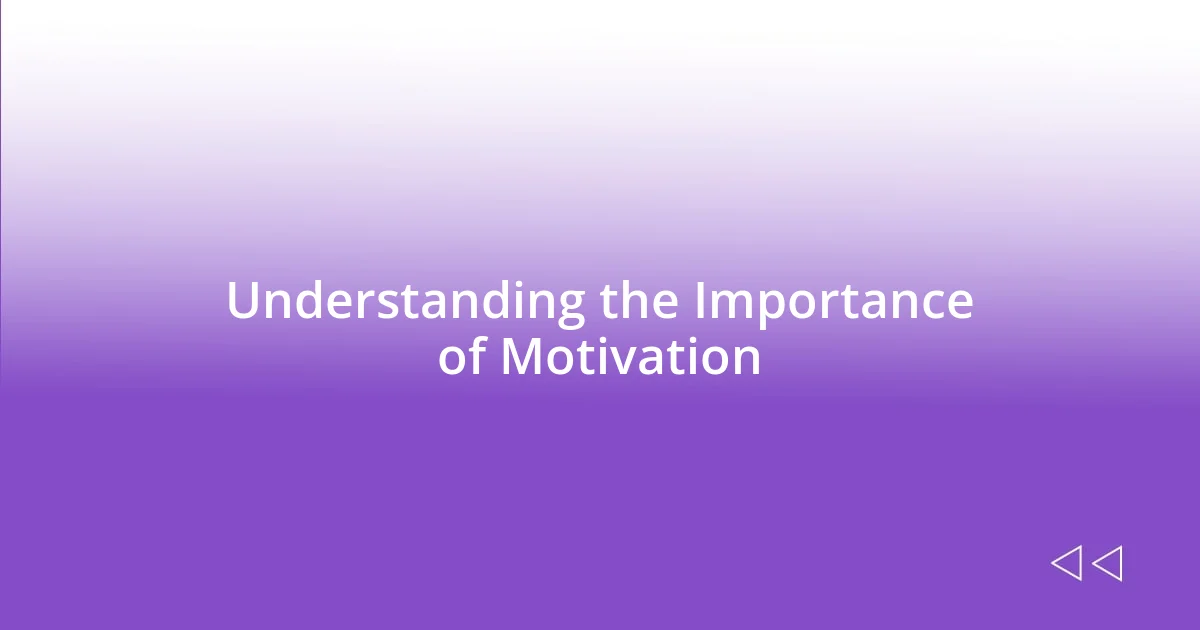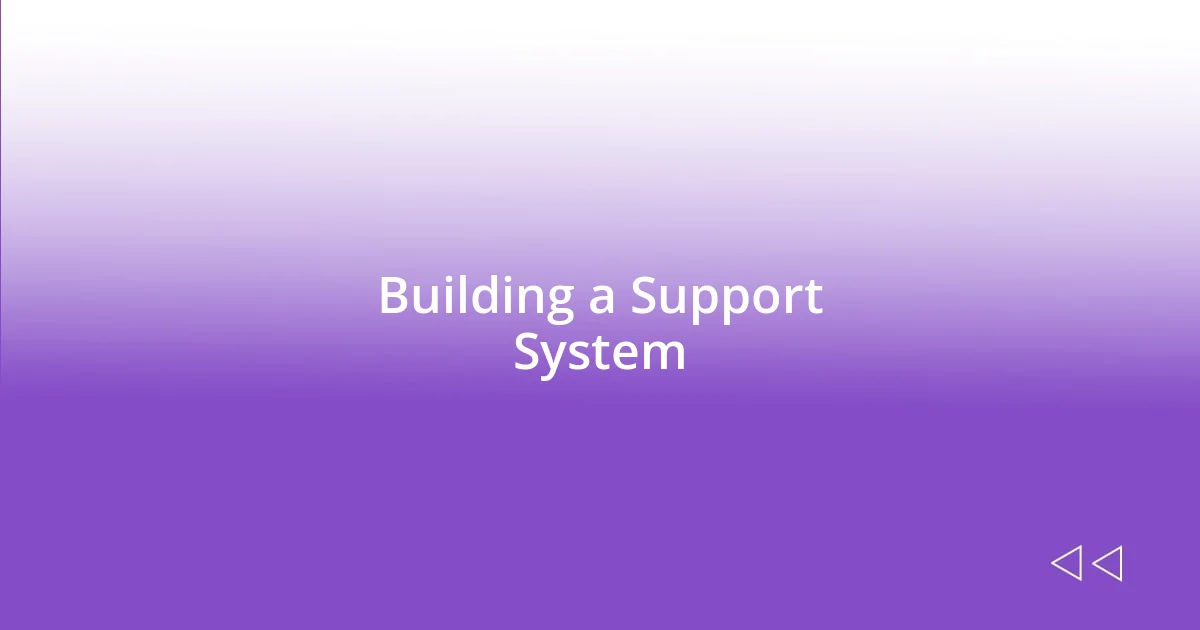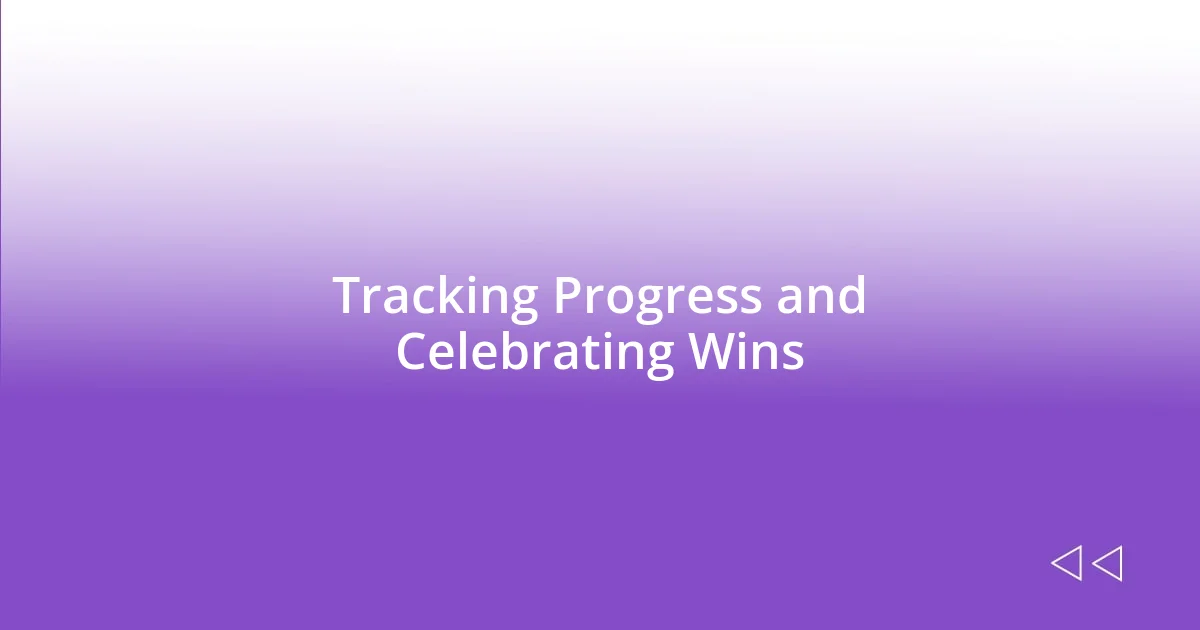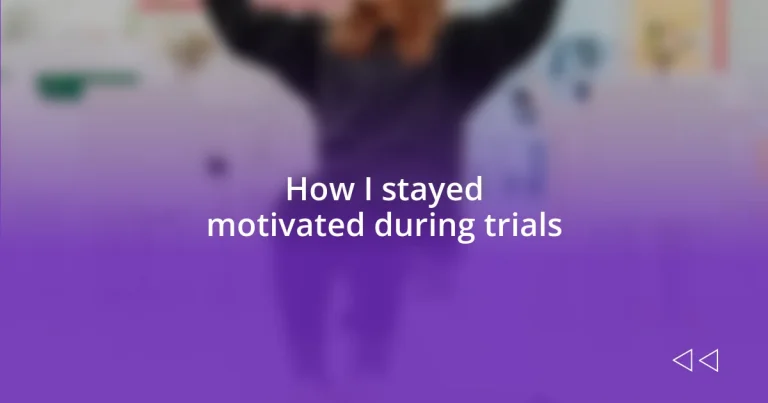Key takeaways:
- Motivation plays a crucial role in navigating challenges, reshaping our mindset from despair to hope.
- Setting clear, achievable goals and breaking larger objectives into manageable tasks fosters progress and motivation.
- Building a support system and celebrating small victories enhances resilience, encouraging a positive mindset and sustained motivation.

Understanding the Importance of Motivation
Motivation is the driving force that propels us through tough times. I recall a particularly challenging moment in my career when I felt completely drained. I had to dig deep to find a flicker of motivation, and that small spark helped me to push through adversity instead of giving up. Have you ever experienced that moment when everything feels overwhelming, yet somehow, you still find a way to keep moving forward?
Understanding the importance of motivation goes beyond just getting through the day; it shapes our goals and aspirations. When I set a goal, such as completing a marathon, motivation was my constant companion. Some days were tougher than others, and it made me ask myself: what do I truly want to achieve? That question drove me to focus on the journey rather than the finish line, reinforcing the idea that motivation is foundational for success.
It’s fascinating to consider how motivation can shift our mindset from despair to hope. I’ve been there—anxiously looking at stacks of deadlines—and needed a perspective change. My thoughts turned to the reasons I started this journey in the first place, which renewed my focus and energized my efforts. In your own challenges, what inner reasons can reignite your motivation when the going gets tough?

Setting Clear Goals for Trials
Setting clear goals during trials serves as a compass to navigate through adversity. I remember a time when I was faced with an intense project at work, and my initial response was to get overwhelmed. To regain control, I broke down my larger objective into smaller, manageable tasks. This approach not only clarified my path but also provided a series of small victories, which lifted my spirits and fueled my motivation.
Establishing specific goals can also prevent us from feeling lost or adrift during challenging periods. For instance, during a personal crisis, I made it a point to set daily intentions rather than focusing solely on the big picture. I crafted achievable goals like “complete one chapter of a book” or “take a 30-minute walk.” These were small yet significant steps that allowed me to celebrate progress, reminding me that even the tiniest accomplishments can foster motivation when faced with bigger trials.
Furthermore, revisiting and adjusting my goals as I progressed helped me stay resilient. In the midst of a daunting trial, I learned that flexibility is key. I once aimed to network with ten professionals in a month, but as life threw curveballs, I adjusted that goal to simply reaching out to one person a week instead. This change not only made it doable but also reduced the pressure I felt, allowing me to stay focused and motivated even amid challenges.
| Large Goals | Small Goals |
|---|---|
| Often overwhelming | Highly achievable |
| Can lead to frustration | Provide quick wins |
| Hard to track progress | Easy to measure success |
| May require total commitment | Can adapt to circumstances |

Developing a Positive Mindset
Developing a positive mindset isn’t an overnight transformation; it’s a gradual shift that takes intention and practice. I vividly remember a time when negativity seemed to cloud my thoughts. I started to pivot my focus toward gratitude, jotting down three things I was thankful for each day. This simple exercise helped to rewire my perspective and reminded me that even small joys exist amidst trials.
Here are some strategies that I found effective in nurturing a positive mindset:
- Practice Self-Compassion: I learned to treat myself with kindness during setbacks, as if I were comforting a friend.
- Affirmations: Each morning, I began to recite positive affirmations, such as “I am resilient” and “Challenges are opportunities for growth.”
- Surround Yourself with Positivity: I made a conscious effort to engage with uplifting people and consume inspiring content, which energized my spirit.
- Mindfulness Meditation: One afternoon, I decided to try meditation. It helped ground my thoughts and provided clarity during stressful moments.
- Limit Negative Input: I became more selective about the news and social media I consumed, noticing how much it influenced my mood throughout the day.
Making these changes didn’t erase my challenges but shifted my approach towards them. I found that embracing a positive mindset gave me the strength to face obstacles with open arms.

Building a Support System
Building a support system has been crucial to my journey through trials. There was a particularly rough patch when I felt isolated and overwhelmed—and that’s when I realized the power of connection. Surrounding myself with friends and family who understood my struggles helped create an environment where I felt safe to express my fears. Have you ever felt the weight of the world on your shoulders, only to find relief in a simple conversation? For me, a heartfelt chat over coffee made all the difference, reminding me that I wasn’t alone.
Sometimes, it’s not just about leaning on those close to you; it’s also about seeking diverse perspectives. I found that joining community groups or online forums related to my challenges provided unexpected insights. There was a time when I joined a local support group, and hearing others share their stories made me realize that we all have our battles. Isn’t it comforting to know that others face similar hardships? This collective understanding fostered a sense of unity, and I left each meeting feeling lighter and more motivated.
One of the most important aspects of building a support system is mutual encouragement. I remember starting a small accountability group with a couple of friends, where we checked in weekly to share our goals and triumphs. That interaction created a supportive atmosphere where we could celebrate each other’s progress. It made me wonder—how often do we uplift those around us? It’s this reciprocal relationship that not only helps us during tough times but also strengthens those bonds, making our group resilient in the face of adversity.

Implementing Daily Motivation Techniques
Implementing daily motivation techniques has become a vital part of my routine. I remember a particularly dreary morning when I struggled to find the energy to get out of bed. In that moment, I decided to set a small goal: create a morning ritual where I would brew my favorite coffee while listening to an inspiring podcast. That simple shift not only elevated my mood but also set a positive tone for the entire day.
One technique that proved to be a game-changer for me was the “2-Minute Rule.” Have you ever faced a task that felt daunting, only to realize you could tackle it in a matter of minutes? I applied this rule by focusing on quick, actionable tasks like organizing my workspace or responding to one email. Each small victory not only built momentum but also instilled a sense of accomplishment, making larger projects feel much more manageable.
Another technique I integrated was the practice of daily reflection. Each evening, I’d take a few moments to ponder what went well that day and what I could improve. It felt rewarding to acknowledge my progress, however insignificant it may have seemed. I found myself thinking—how often do we overlook our own efforts? Recognizing my achievements, no matter how small, fostered a deeper sense of motivation that guided me through the toughest trials.

Tracking Progress and Celebrating Wins
Tracking my progress has been an eye-opener in my journey. I started using a simple journal to document milestones, no matter how minor. One day, I stumbled upon an entry from two months ago that highlighted my struggles. Seeing how far I had come made me feel an immense rush of pride. Have you ever reflected on your growth and felt that surge of accomplishment? It’s truly a powerful reminder of resilience.
Celebrating wins has been just as crucial as tracking them. I remember treating myself to a small gift after reaching a significant goal, like completing a challenging project. It’s about acknowledging your effort, and I believe that these small celebrations act as fuel for the next challenge. But what if we didn’t take those moments to appreciate ourselves? Those little rewards keep my motivation alive, and they remind me that every step forward is worth celebrating.
Sometimes, sharing my successes with close friends amplifies my joy. I recall a time when I told a friend about a personal breakthrough, and we raised a toast to it together. That shared happiness not only strengthened our bond but also inspired me to keep striving for more. Isn’t it fulfilling to have people in your life who celebrate with you? This collective acknowledgment of progress nourishes not just the individual spirit but the connections we cherish.














